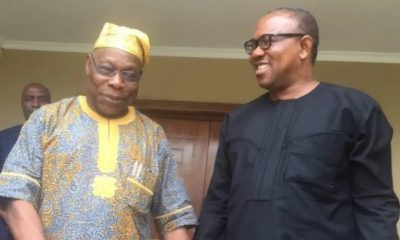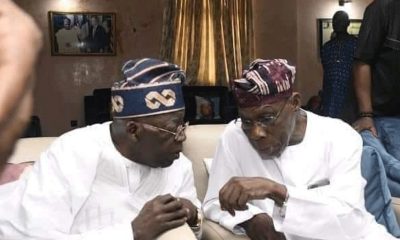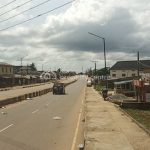Feature/OPED
2023: TVCP and Leadership Recruitment
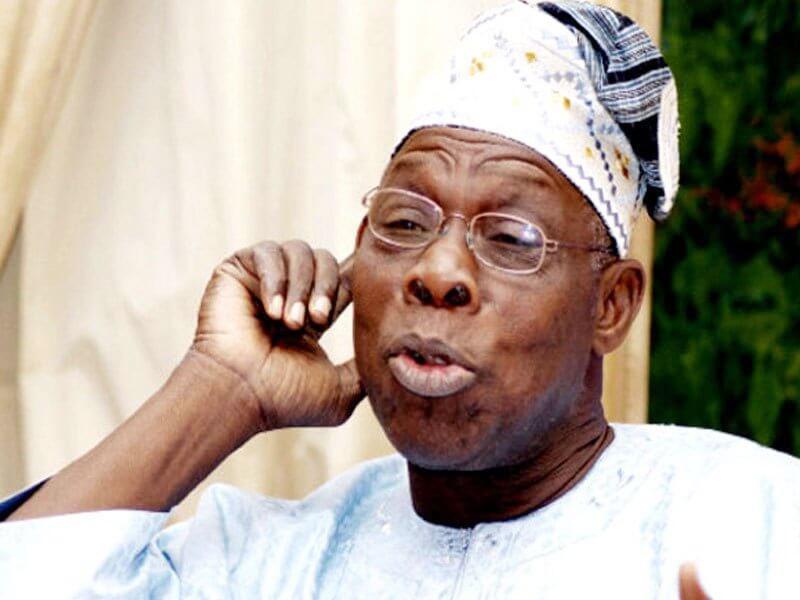
By Jerome-Mario Chijioke Utomi
It is common knowledge that while Nigerians and, of course, the global community were on Sunday, January 1, 2023, celebrating the ‘arrival’ of a brand new year, former President Olusegun Obasanjo released to Nigerians his regular trademark Open Letter, where he, among other remarks, endorsed the Labour Party candidate in the forthcoming general elections in the country, Peter Obi, describing him as a presidential candidate that has the edge over others in terms of knowledge, discipline, vitality and character, and, therefore, admonished Nigerians not allow opportunity that Peter Obi represents in the February 25 presidential poll slip through their hands.
As expected, the development has elicited reactions from political stakeholders and the general public. While some hailed the action of the former president, others viewed it with scepticism. The boundaries between both spheres have shifted back and forth for some days. In some cases, they have ended up igniting a lot of tension.
For instance, the supporters of Peter Obi believe that the insight that flows from Obasanjo’s letter remains credible and encouraged other past leaders to emulate him.
On their part, APC Presidential Campaign Council sees the endorsement as worthless because, in their estimation, the former president does not possess any political goodwill or leverage anywhere in Nigeria to make anyone win a councillorship election, let alone a presidential election.
The Atiku/Okowa Presidential Campaign Organization shares similar opinions with APC. To them, the support for the LP presidential candidate by Obasanjo was his personal wish, which did not reflect the opinion or position of the overwhelming majority of Nigerians across the country.
Indeed, while the debate about the viability or otherwise of the endorsement rages, there are, however, some silent but salient points that Nigerians must not fail to remember.
First and very fundamental is that it takes an illuminated mind to write a good letter, and it is, therefore, important that readers focus more on the message and not the messenger, as no one is infallible.
In the same way, one of the intrinsic privileges participatory democracy and the election of leaders confer on all is the enjoyment of access to the free flow of information. It gives each individual more standing within the society without reference to a class or fortune- to claim a measure of dignity equal to all others and empowers individuals to scrutinize the use of power by those in government so as to ascertain if we are the one using power or whether power is using us.
Considering this fact, I found nothing out-of-ordinary to warrant the ripple reactions that characterized Obasanjo’s recent use of analytical methods to advise Nigerians, particularly the youths, on the forthcoming general election.
Very germane, aside from enjoying the constitutional backing as enshrined in the nations’ 1999 constitution (as amended), to express his opinion, the open letter provided an honest roadmap that will assist Nigerians to elect as President someone that will restore the political and socioeconomic health of the nation.
Obasanjo captured it this way, “I will, without prejudice, fear or ill-will, make bold to say that there are four major factors to watch out for in a leader you will consider to hoist on yourself and on the rest of Nigerians in the coming election and they are what I call TVCP: Track record of ability and performance; Vision that is authentic, honest and realistic; Character and attributes of a lady and a gentleman who are children of God and obedient to God; and Physical and mental capability with the soundness of mind as it is a very taxing and tasking assignment at the best of times and more so it is at the most difficult time that we are.”
More than anything else, Obasanjo’s latest letter, in my view, further confirms that leadership holds the key to unlocking the transformation question in Nigeria, as only a sincere and selfless leader and a politically and economically restructured polity brought about by national consensus can unleash the social and economic forces that can ensure the total transformation of the country and propel her to true greatness.
Supporting the above assertion is the elder statesman’s encouragement of Nigeria to jettison in the country’s leadership recruitment system that has bred corruption, inefficiency, primitive capital accumulation and socially excluded the vast majority of our people, and in its place, work to build a new social and political order that can mobilize the people around common interests, with visionary leadership to drive this venture- as only then can we truly begin to resolve some of the socio-economic contradictions afflicting the nation.
Also, there is, in the opinion of this piece, another strategic reason to believe that issues raised by the former president may not be lacking in merit but should be considered accurate and charitable.
Recall that President Buhari, according to reports, had in March 2015, among other things, described Obasanjo as a courageous patriot and statesman who tells the truth to the power when he is convinced that leaders are going wrong. It is my prayer that PMB and other political gladiators will heed this truth that is now coming from that same courageous patriot.
Away from the current open letter, from public affairs analyst’s point of view, I believe and still believe that there is something fundamentally wrong with APC as a political party acronym that throws into confusion any nation they assume the mantle of leadership. It is not only in Nigeria but in Africa as a continent. If you are in doubt of this claim, wait till you cast a glance at this documented account.
In 1985, the All Peoples Congress (APC) took over the mantle of leadership in Sierra Leone (pre-war days) with Joseph Momoh at the helm of affairs; just immediately, the nation came to a halt; the civil servants’ salaries stopped, the road fell to pieces, the schools disintegrated, the National Television stopped in 1987 when the transmitter was sold by the Minister of Information. And in 1989, a radio tower that relayed radio signals outside Free Town fell, ending transmission outside the capital, with weapons pouring over the border as the government disappeared. The economy finally collapsed, and Sierra Leone kissed calamity.
Looking at the above account in relation to what is currently happening in the political geography called Nigeria, it rings apprehension as to whether the country will not be heading for the Sierra Leone experience if voted again in the forthcoming general election.
Essentially, even if an answer is provided to the above, it will not at any significant level erase the common belief by Nigerians that APC lacks the solution to the hydra-headed socioeconomic challenge facing the nation, a feeling that has, in turn, eroded the goodwill the party enjoyed in 2015.
In my view, what is happening is neither Peter Obi endorsement-specific nor open letter induced. The truth is that before this ripple reaction that trailed the latest letter, Nigerians were shell-shocked at ugly developments in the country under the present federal government.
This worry is particularly evident in the current administration’s inability to keep to the promise made in 2015 and 2019 to create a climate of opinion in the country that will look upon corruption in public offices as a threat to society. Instead, it has plundered and plummeted the country into more corruption while leaving the nation’s economy to walk in the valley of the shadow of death. This failure majorly explains what irked Nigerians against the present administration.
While the ultimate result of what the federal government is doing currently is in the womb of the future, and the result may not be palatable if the trend is allowed to complete its gestation without something dramatic done to have it aborted, the truth must be told to the effect that the APC-led federal government has eloquently proved to be pleasant talkers but inept in political will to implement any policy. They have, within this period, promoted corruption and made the entire brouhaha about the corruption fight superficial that only exists in the frame, with the vision neither sharp nor the goal clear.
Most importantly, Nigerians, particularly the youths, like Obasanjo suggested, must, therefore, not allow themselves to be confused but should look towards building a future that is free of suspicion and a nation that will be viewed at the world stage as the zone of peace and prosperity.
In the interim, this piece holds the opinion that Obasanjo’s open letter and endorsement of Peter Obi remains the most dynamic and cohesive action expected of a past leader of his class to earn a higher height of respect and the former president’s TVCP political formula on its part, is the only way forward.
This is a message that Nigerians, particularly the youths, must not allow to go with political winds.
Utomi is the Programme Coordinator (Media and Policy), Social and Economic Justice Advocacy (SEJA), Lagos. He can be reached via je*********@***oo.com/08032725374
Feature/OPED
Brent’s Jump Collides with CBN Easing, Exposes Policy-lag Arbitrage
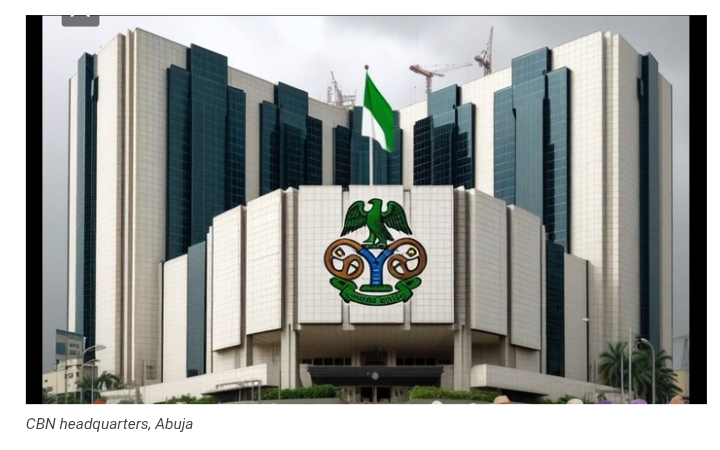
Nigeria is entering a timing-sensitive macro set-up as the oil complex reprices disruption risk and the US dollar firms. Brent moved violently this week, settling at $77.74 on 02 March, up 6.68% on the day, after trading as high as $82.37 before settling around $78.07 on 3 March. For Nigeria, the immediate hook is the overlap with domestic policy: the Central Bank of Nigeria (CBN) has just cut its Monetary Policy Rate (MPR) by 50 basis points to 26.50%, whilst headline inflation is still 15.10% year on year in January.
“Investors often talk about Nigeria as an oil story, but the market response is frequently a timing story,” said David Barrett, Chief Executive Officer, EBC Financial Group (UK) Ltd. “When the pass-through clock runs ahead of the policy clock, inflation risk, and United States Dollar (USD) demand can show up before any oil benefit is felt in day-to-day liquidity.”
Policy and Pricing Regime Shift: One Shock, Different Clocks
EBC Financial Group (“EBC”) frames Nigeria’s current set-up as “policy-lag arbitrage”: the same external energy shock can hit domestic costs, FX liquidity, and monetary transmission on different timelines. A risk premium that begins in crude can quickly show up in delivered costs through freight and insurance, and EBC notes that downstream pressure has been visible in refined markets, with jet fuel and diesel cash premiums hitting multi-year highs.
Market Impact: Oil Support is Conditional, Pass-through is Not
EBC points out that higher crude is not automatically supportive of the naira in the short run because “oil buffer” depends on how quickly external receipts translate into market-clearing USD liquidity. Recent price action illustrates the sensitivity: the naira was quoted at 1,344 per dollar on the official market on 19 February, compared with 1,357 a week earlier, whilst street trading was cited around 1,385.
At the same time, Nigeria’s inflation channel can move quickly even during disinflation: headline inflation eased to 15.10% in January from 15.15% in December, and food inflation slowed to 8.89% from 10.84%, but energy-led transport and logistics costs can reintroduce pressure if the risk premium persists. EBC also points to a broader Nigeria-specific reality: the economy grew 4.07% year on year in 4Q25, with the oil sector expanding 6.79% and non-oil 3.99%, whilst average daily oil production slipped to 1.58 million bpd from 1.64 million bpd in 3Q25. That mix supports external-balance potential, but it also underscores why the domestic liquidity benefit can arrive with a lag.
Nigeria’s Buffer Looks Stronger, but It Does Not Eliminate Sequencing Risk
EBC sees that near-term external resilience is improving. The CBN Governor said gross external reserves rose to USD 50.45 billion as of 16 February 2026, equivalent to 9.68 months of import cover for goods and services. Even so, EBC views the market’s focus as pragmatic: in a risk-off tape, investors tend to price the order of transmission, not the eventual balance-of-payments benefit.
In the near term, EBC expects attention to rotate to scheduled energy and policy signposts that can confirm whether the current repricing is a short, violent adjustment or a more durable regime shift, including the U.S. Energy Information Administration (EIA) Short-Term Energy Outlook (10 March 2026), OPEC’s Monthly Oil Market Report (11 March 2026), and the U.S. Federal Reserve meeting (17 to 18 March 2026). On the domestic calendar, the CBN’s published schedule points to the next Monetary Policy Committee meeting on 19 to 20 May 2026.
Risk Frame: The Market Prices the Lag, Not the Headline
EBC cautions that outcomes are asymmetric. A rapid de-escalation could compress the crude risk premium quickly, but once freight, insurance, and hedging behaviour adjust, second-round effects can linger through inflation uncertainty and a more persistent USD bid.
“Oil can act as a shock absorber for Nigeria, but only when the liquidity channel is working,” Barrett added. “If USD conditions tighten first and domestic pass-through accelerates, the market prices the lag, not the headline oil price.”
Brent remains an anchor instrument for tracking this timing risk because it links energy-led inflation expectations, USD liquidity, and emerging-market risk appetite in one market. EBC Commodities offering provides access to Brent Crude Spot (XBRUSD) via its trading platform for following energy-driven macro volatility through a single instrument.
Feature/OPED
Gen Alpha: Africa’s Digital Architects, Not Your Target Audience

By Emma Kendrick Cox
This year, the eldest Gen Alpha turns 16.
That means they aren’t just the future of our work anymore. They are officially calling for a seat at the table, and they’ve brought their own chairs. And if you’re still calling this generation born between 2010 and 2025 the iPad generation, then I hate to break it to you, but you’re already obsolete. To the uninitiated, they look like a screen-addicted mystery. To those of us paying attention, they are the most sophisticated, commercially potent, and culturally fluent architects Africa has ever seen.
Why? Because Alphas were not born alongside the internet. They were born inside it. And by 2030, Africa will be home to one in every three Gen Alphas on the planet.
QWERTY the Dinosaur
We are witnessing the rise of a generation that writes via Siri and speech-to-text before they can even hold a pencil. With 63% of these kids navigating smartphones by age five, they don’t see a QWERTY keyboard as a tool. They see it as a speed bump, the long route, an inefficient use of their bandwidth. They don’t need to learn how to use tech because they were born with the ability to command their entire environment with a voice note or a swipe.
They are platform agnostic by instinct. They don’t see boundaries between devices. They’ll migrate from an Android phone to a Smart TV to an iPhone without breaking their stride. To them, the hardware is invisible…it’s the experience that matters.
They recognise brand identities long before they know the alphabet. I share a home with a peak Gen Alpha, age six and a half (don’t I dare forget that half). When she hears the ding-ding-ding-ding-ding of South Africa’s largest bank, Capitec’s POS machine, she calls it out instantly: “Mum! Someone just paid with Capitec!” It suddenly gives a whole new meaning to the theory of brand recall, in a case like this, extending it into a mental map of the financial world drawn long before Grade 2.
And it ultimately lands on this: This generation doesn’t want to just view your brand from behind a glass screen. They want to touch it, hear it, inhabit it, and remix it. If they can’t live inside your world, you’re literally just static.
The Uno Reverse card
Unlike any generation we’ve seen to date, households from Lagos to Joburg and beyond now see Alphas hold the ultimate Uno Reverse card on purchasing power. With 80% of parents admitting their kids dictate what the family buys, these Alphas are the unofficial CTOs and Procurement Officers of the home:
-
The hardware veto: Parents pay the bill, but Alphas pick the ISP based on Roblox latency and YouTube 4K buffers.
-
The Urban/Rural bridge: In the cities, they’re barking orders at Alexa. In rural areas, they are the ones translating tech for their families and narrowing the digital divide from the inside out.
-
The death of passive: I’ll fall on my sword when I say that with this generation, the word consumer is dead. It implies they just sit there and take what you give them, when, on the contrary, it is the total opposite. Alphas are Architectural. They are not going to buy your product unless they can co-author the experience from end to end.
As this generation creeps closer and closer to our bullseye, the team here at Irvine Partners has stopped looking at Gen Alpha as a demographic and started seeing them as the new infrastructure of the African market. They are mega-precise, fast, and surgically informed.
Believe me when I say they’ve already moved into your industry and started knocking down the walls. The only question is: are you building something they actually want to live in, or are you just a FaceTime call they are about to decline?
Pay attention. Big moves are coming. The architects are here.
Emma Kendrick Cox is an Executive Creative Director at Irvine Partners
Feature/OPED
Why Digital Trust Matters: Secure, Responsible AI for African SMEs?

By Kehinde Ogundare
For years, security for SMEs across sub-Saharan Africa meant metal grilles and alarm systems. Today, the most significant risks are invisible and growing faster than most businesses realise.
Artificial Intelligence has quietly embedded itself into everyday operations. The chatbot responding to customers at midnight, the system forecasting inventory requirements, and the software identifying unusual transactions are no longer experimental technologies. They are becoming standard features of modern business tools.
Last month’s observance of Safer Internet Day on February 10, themed ‘Smart tech, safe choices’, marked a pivotal moment. As AI adoption accelerates, the conversation must shift from whether businesses should use AI to how they deploy it responsibly. For SMEs across Africa, digital trust is no longer a technical consideration. It is a strategic business imperative.
The evolving threat landscape
Cybersecurity threats facing sub-Saharan African SMEs have moved well beyond basic phishing emails. Globally, cybercrime costs are projected to reach $10.5 trillion this year, fuelled by generative AI and increasingly sophisticated social engineering techniques. Ransomware attacks now paralyse entire operations, while other threats quietly extract sensitive customer data over extended periods.
The regional impact is equally significant. More than 70% of South African SMEs report experiencing at least one attempted cyberattack, and Nigeria faces an average of 3,759 cyberattacks per week on its businesses. Kenya recorded 2.54 billion cyber threat incidents in the first quarter of 2025 alone, whilst Africa loses approximately 10% of its GDP to cyberattacks annually.
The hidden risk of fragmentation
A common but often overlooked vulnerability lies in digital fragmentation.
In the early stages of growth, SMEs understandably prioritise affordability and agility. Over time, this can result in a patchwork of disconnected applications, each with separate logins, security standards, and privacy policies. What begins as flexibility can involve operational complexity.
According to IBM Security’s Cost of a Data Breach Report, companies with highly fragmented security environments experienced average breach costs of $4.88 million in 2024.
Fragmented systems create blind spots; each additional data transfer between applications increases exposure. Inconsistent security protocols make governance harder to enforce. Limited visibility reduces the ability to detect anomalies early. In practical terms, complexity increases risk.
Privacy-first AI as a competitive differentiator
As AI capabilities become embedded in business software, SMEs face a choice about how they approach these powerful tools. The risks are not merely theoretical.
Consumers across Africa are becoming more aware of data rights and are willing to walk away from businesses that cannot demonstrate trustworthiness. According to KPMG’s Trust in AI report, approximately 70% of adults do not trust companies to use AI responsibly, and 81% expect misuse. Meanwhile, studies also show that 71% of consumers would stop doing business with a company that mishandles information.
Trust, once lost, is difficult to rebuild. In the digital age, a single data leak can destroy a reputation that took ten years to build. When customers share their payment details or purchase history, they extend trust. How you handle that trust, particularly when AI processes their data, determines whether they return or take their business elsewhere.
Privacy-first, responsible AI design means building intelligence into business systems with data protection, transparency and ethical use embedded from the outset. It involves collecting only necessary information, storing it securely, being transparent about how AI makes decisions, and ensuring algorithms work without compromising customer privacy. For SMEs, this might mean choosing inventory software where predictive AI runs on your own data without sending it externally, or customer service platforms that analyse patterns without exposing individual records. When AI is built responsibly into unified platforms, it becomes a competitive advantage: you gain operational efficiency whilst demonstrating that customer data is protected, not exploited.
Unified platforms and operational resilience
The solution lies in rethinking digital infrastructure. Rather than accumulating disparate tools, businesses need unified platforms that integrate core functions whilst maintaining consistent security protocols.
A unified approach means choosing cloud-based platforms where functions share common security standards, and data flows seamlessly. For a manufacturing SME, this means inventory management, order processing and financial reporting operate within a single security framework.
When everything operates cohesively, security gaps diminish, and the attack surface shrinks. And the benefits extend beyond risk reduction: employees spend less time on administrative friction, customer data stays consistent, and platforms enable secure collaboration without traditional infrastructure costs.
Safer Internet Day reminds us that the digital world requires active stewardship. For SMEs across the African continent who are navigating complex threats whilst harnessing AI’s potential, digital trust is foundational to sustainable growth. Security, privacy and responsible AI are essential characteristics of any technology infrastructure worth building upon. Businesses that embrace unified, privacy-first platforms will be more resilient against cyber threats and better positioned to earn and maintain trust. In a market where trust is currency, that advantage is everything.
Kehinde Ogundare is the Country Head for Zoho Nigeria
-

 Feature/OPED6 years ago
Feature/OPED6 years agoDavos was Different this year
-
Travel/Tourism10 years ago
Lagos Seals Western Lodge Hotel In Ikorodu
-

 Showbiz3 years ago
Showbiz3 years agoEstranged Lover Releases Videos of Empress Njamah Bathing
-

 Banking8 years ago
Banking8 years agoSort Codes of GTBank Branches in Nigeria
-

 Economy3 years ago
Economy3 years agoSubsidy Removal: CNG at N130 Per Litre Cheaper Than Petrol—IPMAN
-

 Banking3 years ago
Banking3 years agoSort Codes of UBA Branches in Nigeria
-

 Banking3 years ago
Banking3 years agoFirst Bank Announces Planned Downtime
-

 Sports3 years ago
Sports3 years agoHighest Paid Nigerian Footballer – How Much Do Nigerian Footballers Earn


